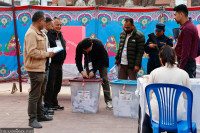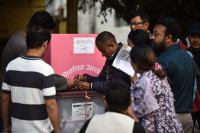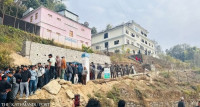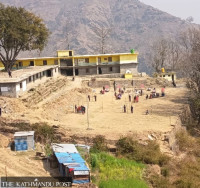National
New dispute hovers over judiciary with acting chief justice and justices at odds
The recent rift is over whether to allow the anti-graft body to investigate the construction of a new court building.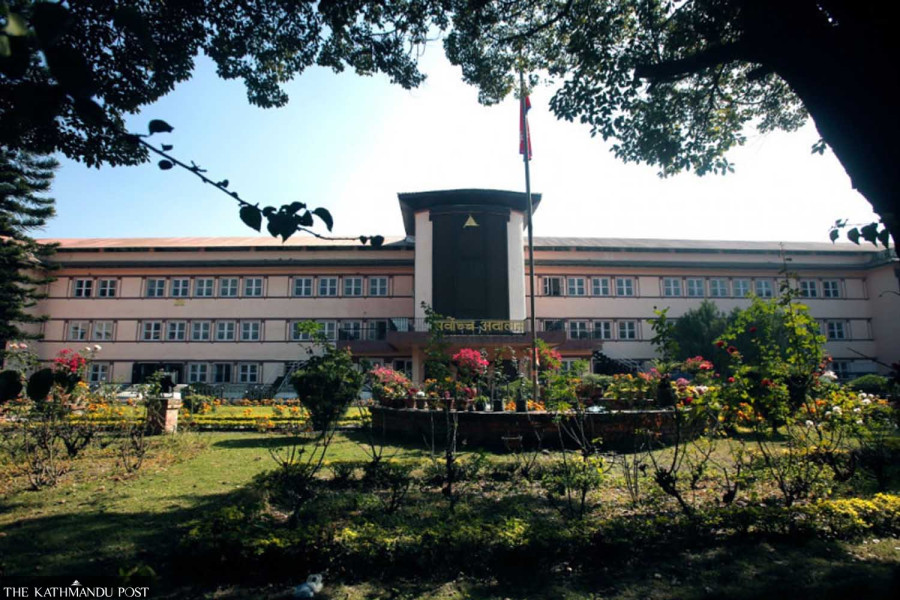
Tika R Pradhan
Supreme Court justices are up in arms over Acting Chief Justice Deepak Kumar Karki’s recent letter to the anti-graft body to continue investigation into alleged corruption in the ongoing construction of a new building for the Supreme Court.
Most of the senior justices, according to insiders, have questioned acting Chief Justice Karki, over his letter to the Commission for Investigation of Abuse of Authority inviting it to probe into the alleged corruption.
A new building for the Supreme Court is being constructed just behind its current location, on a plot on the Singha Durbar premises.
The development indicates that fissures have grown between justices and Karki, who together fought against Chief Justice Cholendra Shumsher Rana.
Karki became acting chief justice after Rana’s suspension on February 13 following the registration of an impeachment motion against him in the Parliament Secretariat by three ruling parties.
Hari Bhattarai, secretary of the “authentic trade union” of the Supreme Court, said after learning that Narayan Panthi, the acting chief registrar, had sent a letter to the anti-graft body on April 29, Acting Chief Justice Karki shot another letter on July 13.
According to Supreme Court sources, Panthi had sent a letter in response to a query about the complaints filed at the Commission for the Investigation of Abuse of Authority (CIAA) on April 17. In the letter, Panthi said the anti-graft body “cannot investigate” into decisions taken by the Chief Justice [Rana] of the Supreme Court.
However, stating that the registrar sent the letter by keeping him in the dark, Karki on July 13 wrote to the anti-graft in which he said “it can continue the investigation.”
Both the letters have been seen by the Post.
Justices were riled up.
“It seems the justices fear that this could set a precedent for the anti-graft body to investigate into their [justices’] activities also,” said Bhattarai.
Karki retires on October 2, and most of the senior justices will succeed to helm the judiciary.
Nepal’s top court has been embroiled in a series of controversies, with the judiciary taking the centre stage for all the wrong reasons during the tenure of Rana.
Months after Rana’s suspension, it is embroiled in another controversy with senior justices and the acting chief justice at odds.
Insiders in the judiciary say justices have objected to both the letters. They had demanded on Friday that Karki call a meeting of the full court to discuss the matter. Karki refused, according to insiders.
“I have heard that most of the senior justices have expressed their dissatisfaction at both the letters sent to the anti-graft body and demanded a full court meeting,” said a senior official at the Supreme Court who spoke on condition of anonymity because he is not authorised to speak to the media. “However, Karki refused.”
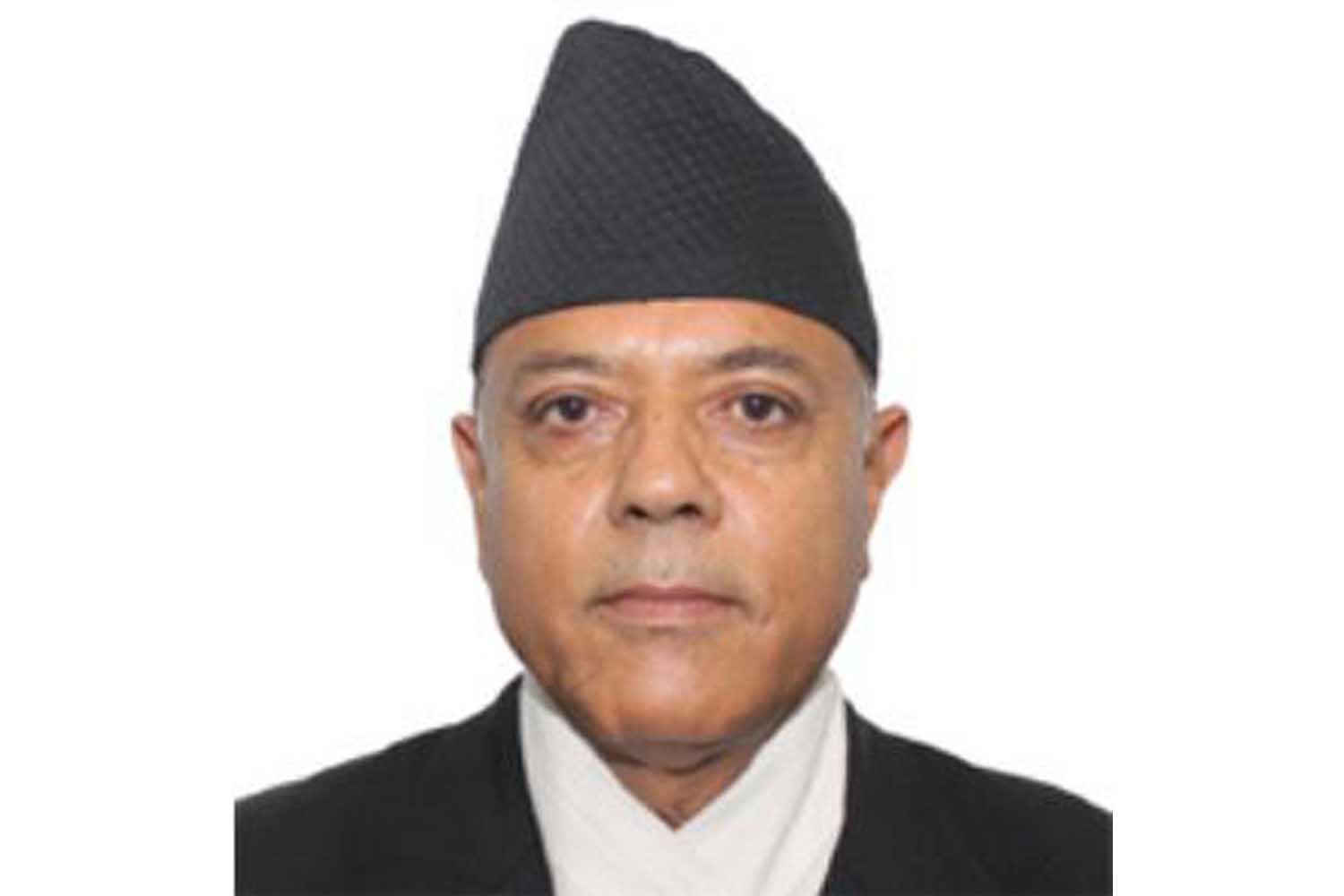
Observers say any conflict between the head of the Supreme Court and other justices could further tarnish the image of the judiciary, which has been facing a crisis of credibility of late.
Before Rana’s suspension, Karki was the senior most justice and he and other justices were united against Rana charging him with promoting corruption. They accused Rana of refusing to implement a report prepared by Justice Hari Krishna Karki suggesting reform measures.
They had even refused to attend a full court meeting called by Rana and later boycotted the benches that they had to share with him.
After lawyers joined the protest against Rana, the judiciary was gridlocked for months.
One of the senior justices of the Supreme Court admitted there are some issues.
“[But] We will resolve the issue through discussions. Let’s not amplify it as it could harm the encouraging progress that we have seen in the judiciary,” the justice told the Post, asking not to be named.
Another justice, however, said the problem lies with Acting Chief Justice Karki, who refused to call the full court meeting to discuss multiple outstanding issues, including his unilateral writing of the letter.
“Actually the concern of the justices is about his working style as he has lately started taking decisions unilaterally without consulting other justices,” said the justice who also refused to be named. “He used to oppose deputation of officials of the judiciary but he is preparing to depute a large number of people without discussing it in the full court.”
The justice said other justices are not happy with the way Registrar Panthi refused to allow the anti-graft body to investigate the construction works and the way Acting Chief Justice Karki sent another letter through his secretariat instead of using the proper channel of the chief registrar.
The latest controversy has arisen just as the Supreme Court was starting to implement the report of Justice Hari Krishna Karki.
Acting Chief Justice Karki had also launched a campaign to clean-up the judiciary, by taking action against at least five judges for wrongdoings and failure to meet the criteria.
Some say such recurring controversies could make it impossible for the judiciary to earn its lost glory, at a time when ordinary people and the intellectuals are questioning its credibility.
Many former justices of the Supreme Court had also pinned hopes that the judiciary would be back on track after Rana’s suspension.
Observers say the judiciary needs reforms, not a fight between the acting chief justice and justices.
Balaram KC, a former Supreme Court justice, said there seems to be attempts not to allow acting Chief Justice Karki to continue his reform measures and the ongoing controversy against him is also a part of such attempts.
“Karki has been trying to bring reforms in judiciary and is preparing to take a decision on the 52 constitutional appointees and therefore attempts are being made to disgrace him,” said KC, who has been supporting Karki’s move since his appointment as acting chief justice.
On whether the anti-graft body could investigate alleged corruption in the construction of the Supreme Court building, KC said the job of the justices was only to impart justice and they should not be involved in administrative works related to construction.
“Though they have immunity against investigation on their judgment, their administrative functions are always open to investigation if they take such responsibility,” KC said. “The existing regulations of the Supreme Court must be amended to bar justices from taking positions in different committees that handle the Supreme Court’s administrative works.”
Bhimarjun Acharya, an advocate and expert on constitutional affairs, said the ongoing controversy in the judiciary has stemmed from the fact that some people don’t want the anti-graft body to investigate court-related corruption.
“Certain court officials don’t want the commission to investigate corruption charges involving construction of court buildings,” Acharya told the Post. “Barring the commission from investigations will only promote corruption. But the investigation should focus on administrative irregularities only.”




 25.15°C Kathmandu
25.15°C Kathmandu
